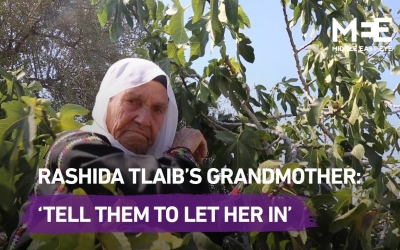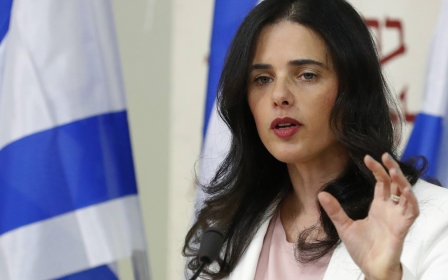Israeli press review: New policy seeks to have Palestinians leave Gaza forever

New Israeli policy encourages Gaza residents to leave permanently
On Monday, a senior Israeli official revealed to Haaretz newspaper a new Israeli policy allowing Palestinians to leave the besieged Gaza Strip on the condition that they will emigrate to another country and will never be allowed to return.
The official said that Israel may finance travel costs in order to encourage emigration, however he added that Israel had reached out to various countries in the Middle East, which refused to accept Palestinian immigrants from Gaza under these conditions.
Shortly after the policy was revealed, Ayelet Shaked, the chairwoman of far-right Israeli party Yamina, expressed support for the programme, calling the emigration of Gaza residents an “Israeli interest".
Thousands of Palestinians have reportedly left the Gaza Strip in the past year, as living conditions have further worsened 12 years into a crippling Israeli-led and Egypt-enforced blockade and almost a year and a half into a mass protest movement known as the Great March of Return, which has been violently repressed by Israeli forces.
New MEE newsletter: Jerusalem Dispatch
Sign up to get the latest insights and analysis on Israel-Palestine, alongside Turkey Unpacked and other MEE newsletters
Israel has a long record of using economic, political and military pressure to push Palestinians to leave the occupied Palestinian territory and Israel - dating back to the mass displacement known as the Nakba, or “catastrophe”, of 1948 during the establishment of the state of Israel.
Sara Netanyahu sparks scandals in Ukraine
When Israeli journalists wondered about Prime Minister Benjamin Netanyahu’s decision to travel to Ukraine just a month before legislative elections, he denied that it was a gimmick to court Russian-speaking voters in Israel.
Pro-government Channel 20 even reported that Netanyahu would attempt to convince the newly elected president of Ukraine, Volodymyr Zelensky, to move the Ukrainian embassy to Jerusalem. But a meeting between the two heads of state achieved only a photo opportunity and a few minor trade agreements.
Israeli media, meanwhile, has focused its attention on the antics of the prime minister’s wife, Sara Netanyahu.
Reports emerged that, upon boarding the plane for the outgoing flight, Sara Netanyahu was enraged that the pilot did not greet her properly. She then reportedly attempted to burst into the pilot’s cabin, but was blocked from doing so by security guards.
Vice Minister of Foreign Affairs Tzipi Hotovely, who was also on board, however denied in an interview with Mako that such an incident had taken place.
Meanwhile, a video taken of the Netanyahus disembarking upon landing in Ukraine also stirred controversy. Footage showed the couple greeted by hostesses carrying traditional bread and salt. While Benjamin Netanyahu ceremoniously took a bite and handed a piece to his wife, Sara Netanyahu was then seen throwing it on the ground.
Israeli spy planes sold to the UAE
Investigative journalists writing for Haaretz revealed on Tuesday details of a secret arms deal between an Israeli businessman and the United Arab Emirates.
Little-known Israeli businessman Mati Kochavi allegedly sold two spy planes to the UAE a year ago, according to leaked documents. The planes required a lengthy upgrade in the United Kingdom and are expected to be deployed soon, allegedly to spy on Iran and other areas of the Middle East.
In his dealings with the UAE, Kochavi reportedly kept the word “Israel” off the documents - as relationships between Israel and Gulf countries remain something of a taboo despite becoming more of an open secret in recent years.
Israeli law requires that arms deals be approved by the Ministry of Defence. Yet Maariv newspaper revealed in June that extensive arms deals were already in place between Israel and the UAE.
New right-wing candidate is light on religion, heavy on racism
A controversial candidate for right-wing religious party Yamina, Roni Sassover, has achieved overnight fame in Israel after securing the ninth spot on its electoral list.
Yamina is expected to win nine to 12 seats in upcoming legislative elections, according to recent polls.
With her place in the Israeli parliament - also known as the Knesset - all but assured, Can 13, Srugim and Israel Hayom all ran stories introducing the previously anonymous candidate to the public.
The Can 13 profile stirred questions over Sassover’s religious credentials, as the news outlet quizzed the candidate on her knowledge of Judaism, finding that she knew little about religion and could not quote from the Torah.
While Sassover's position on a religious party list was questioned, Haaretz columnist Amira Hass has pointed to a tweet dating back to February 2018 showing the candidate’s far-right views of Palestinians.
In the tweet, Sassover quoted her grandmother as saying three things: “A good Arab is a ... Arab”; “If you turn your back to an Arab he will stab it with a knife”; and “Be friends with whomever you want, but only marry a Jew.”
Sassover concluded by writing “Grandmother is always right.”
Hass explained that the first sentence attributed to Sassover’s grandmother was a thinly-veiled allusion to the Israeli expression “A good Arab is a dead Arab”, and contrasted Sassover’s evocation of her grandmother with that of US Congresswoman Rashida Tlaib, whose political tour of the occupied Palestinian territory was recently barred by Israel, prompting the Palestinian-American politician to renounce seeing her grandmother in the West Bank over demands that she stay quiet about political matters during her visit.
* Israeli press review is a digest of reports that are not independently verified as accurate by Middle East Eye.
Middle East Eye delivers independent and unrivalled coverage and analysis of the Middle East, North Africa and beyond. To learn more about republishing this content and the associated fees, please fill out this form. More about MEE can be found here.





